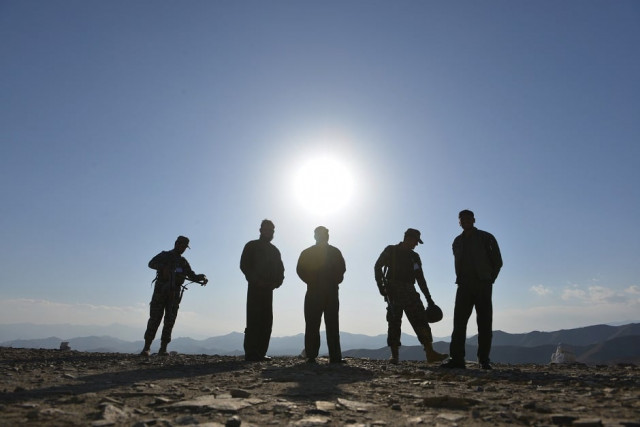The illusion of democracy
Pakistanis have been denied democracy by the relentless military interventions

PHOTO: AFP
Likewise, the most dangerous aspect of propaganda is the perception of its absence, the belief that it doesn’t exist in my backyard. Most Americans have been sold that belief. That propaganda is done by the Russians, Iranians, North Koreans and Venezuelans. Not us.
Last week, one of the Saudi soldiers receiving training at the elite Naval Air Station at Pensacola, Florida, killed three American soldiers and wounded eight. President Trump, who still likes to say “America First”, promptly tweeted, “King Salman of Saudi Arabia just called to express his sincere condolences and give his sympathies to the families and friends of the warriors who were killed and wounded in the attack that took place in Pensacola, Florida.” He sounded like he was trying to sanitise the horrific crime, acting as a criminal defence attorney for the Saudis. The FBI, however, said it “was an act of terror”.
And now the latest Washington Post report sheds light on how the American public representatives have been misleading the American people about the war in Afghanistan. They told the American people that they were making progress in Afghanistan when they had no direction and were losing the war. It is almost a déjà vu of an earlier episode of another war.
In the late 1960s, the American elected representatives knew that the Vietnam War was going very badly and they were headed towards a humiliating defeat. But they kept lying to the American people about their successes in Vietnam. Those disingenuous claims disturbed many in the administration who had access to first-hand knowledge of the on-ground situation. One of them was Daniel Ellsberg, who became the legendary whistleblower. He teamed up with Washington Post’s Bob Woodward and Carl Bernstein, and provided them top secret documents, The Pentagon Papers, a top secret defence department study about the American political and military involvement in Vietnam.
Those revelations resulted in scathing articles by The New York Times and The Washington Post, changing people’s perceptions about the war. Similarly, the office of the Special Inspector General for Afghanistan Reconstruction (SIGAR) was created in 2008, as a government watchdog for the Afghanistan War, and released quarterly progress reports.
The Washington Post obtained the 2,000-page report through a Freedom of Information Act request and years of legal battles with the SIGAR. Douglas Lute, a retired three-star army general, said, “We were devoid of a fundamental understanding of Afghanistan — we didn’t know what we were doing.” In 2015, he told government interviewers, “What are we trying to do here? We didn’t have the foggiest notion of what we were undertaking.”
The current generation of Americans was fooled and lied to like their parents were during the Vietnam War. Kids who were infants when 9/11 happened are still going to Afghanistan to die because of these lies. When democracy becomes confined to voting and doesn’t have repercussions for leaders who make promises they don’t keep, or worse, do things in the shadow and keep the domestic enemy in the dark, then a big question mark appears on a key requirement of democracy: an informed citizenry.















COMMENTS
Comments are moderated and generally will be posted if they are on-topic and not abusive.
For more information, please see our Comments FAQ